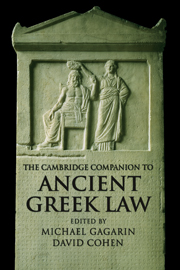Book contents
- Frontmatter
- Introduction
- Part 1: Law in Greece
- Part 2: Law in Athens I: Procedure
- Part 3: Law in Athens II: Substantive Law
- Part 4: Law outside Athens
- Part 5: Other Approaches to Greek Law
- 19 Law, Attic Comedy, and the Regulation of Comic Speech
- 20 Greek Tragedy and Law
- 21 Law and Political Theory
- 22 Law and Nature in Greek Thought
- Bibliography
- Index
19 - Law, Attic Comedy, and the Regulation of Comic Speech
from Part 5: - Other Approaches to Greek Law
Published online by Cambridge University Press: 28 August 2006
- Frontmatter
- Introduction
- Part 1: Law in Greece
- Part 2: Law in Athens I: Procedure
- Part 3: Law in Athens II: Substantive Law
- Part 4: Law outside Athens
- Part 5: Other Approaches to Greek Law
- 19 Law, Attic Comedy, and the Regulation of Comic Speech
- 20 Greek Tragedy and Law
- 21 Law and Political Theory
- 22 Law and Nature in Greek Thought
- Bibliography
- Index
Summary
Athens' Old and New Comedy illuminate that city's laws and legal practices in contrasting ways, reflecting political and social differences between the fifth and fourth centuries and shifting literary foci.
Surviving chiefly in the plays of Aristophanes (active 427-388), Old Comedy pushed to its limits Athens' robust democracy, uncensored speech, and unrestrained freedom. These plays satirized many aspects of contemporary society, including politics and the democracy. Typically, their stance was that of conservative critic, in ambiguous tension with self-parody and comic release. Old Comedy is important for the history of law in three ways. First (and often incidentally), many plays provide detailed evidence for various Athenian laws and legal procedures, such as the denunciations called “showing” (phainein), the litigation of market offenses, and credit regulations. Although scattered and fragmentary, these testimonia can be of central importance in reconstructing Attic law during the fifth century, which is poorly known in contrast to “the age of the orators.” Old Comedy's representations of that notorious figure the “sykophant,” an abusive prosecutor, are fundamental to our understanding of that phenomenon.
- Type
- Chapter
- Information
- The Cambridge Companion to Ancient Greek Law , pp. 357 - 373Publisher: Cambridge University PressPrint publication year: 2005
- 8
- Cited by

